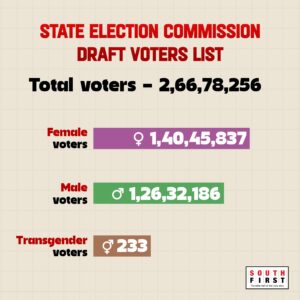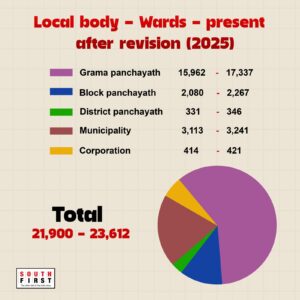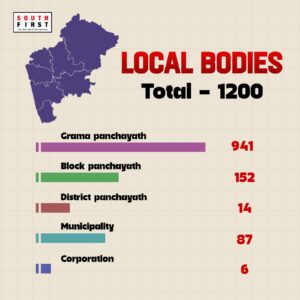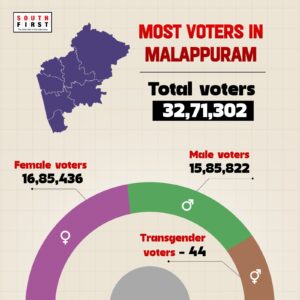Published Aug 01, 2025 | 9:00 AM ⚊ Updated Aug 01, 2025 | 4:41 PM

File photo of voters in Kerala. (CEOKeralaOffice/Facebook)
Synopsis: The draft voters’ list, published by the State Election Commission, has ignited a political storm, drawing sharp criticism from Opposition parties and the public alike. The Congress-led UDF and the BJP strongly criticised the process and alleged large-scale irregularities.
The countdown to Kerala’s local body elections has begun — but not without controversy. The long-awaited draft voters’ list, published by the State Election Commission (SEC) on 23 July, has ignited a political storm, drawing sharp criticism from Opposition parties and the public alike.
With glaring errors ranging from missing names to voters being wrongly assigned to other wards or even constituencies, the draft has not only triggered confusion but also raised serious concerns about the fairness of the upcoming polls.
As the Congress hints at a legal battle and the BJP echoes dissent, the SEC now faces mounting pressure to clean up the list before the final roll is published on 30 August.
Citizens have until 7 August to ensure their names are correctly included — or risk being left out of the democratic process.
 The draft electoral roll lists a total of 2,66,78,256 voters, comprising 1,26,32,186 males, 1,40,45,837 females, and 233 transgenders, spread across 20,998 wards in 1,034 local bodies.
The draft electoral roll lists a total of 2,66,78,256 voters, comprising 1,26,32,186 males, 1,40,45,837 females, and 233 transgenders, spread across 20,998 wards in 1,034 local bodies.
This includes 941 grama panchayats, 86 municipalities, 6 corporations, 152 block panchayats, and 14 district panchayats — excluding Mattanur Municipality in Kannur, whose term ends only in September 2027.
According to State Election Commissioner (SEC) A Shahjahan, the draft roll was meticulously prepared by revising the electoral rolls used in the 2020 local body elections, incorporating bye-election updates, and summary revisions conducted in October 2023 and July 2024.
In 2023, 57,640 new voters were added while 8,76,879 ineligible names were removed, leading to a final roll of 2,68,51,297. A further revision in July 2024 added 2,68,907 new voters and removed 4,52,951 ineligible names, bringing the total to 2,66,72,979. These adjustments were seamlessly reflected in the new wards created through delimitation, without excluding any eligible voter, said the SEC.
The First Level Checking (FLC) of Electronic Voting Machines (EVMs), crucial for the polls, will be carried out from 25 July to 25 August. The SEC has urged political parties to cooperate in ensuring the electoral roll accuracy, and the smooth conduct of the EVM fitness checks.
Citizens who turned 18 by 1 January 2025 are eligible to enrol, ensuring a robust and inclusive electoral process.
While the rest of Kerala gears up for local body elections later this year, Mattannur municipality in Kannur district will once again sit out.
The reason: Its five-year council term is offset from the rest of the state and will end only on 10 September 2027.
Elections were last held in Mattannur in 2022, unlike the 1,199 other local bodies — grama panchayats, municipalities, corporations, and others—that went to polls in 2020.
It’s said, this unique schedule stems from a political row in the 1990s over Mattannur’s elevation to a municipality. Though declared a municipality by the LDF in 1990, the decision was revoked by the UDF in 1991. After a legal tussle, Mattannur finally became a municipality in 1996, with its first polls held in 1997.
Despite delimitation increasing its wards from 35 to 36, the voters’ list for Mattannur will still follow the old structure, the State Election Commission said.
Meanwhile, the Congress-led UDF and the BJP strongly criticised the process and alleged large-scale irregularities.
 Congress leader and CWC member Ramesh Chennithala accused the Commission of acting in collusion with the ruling CPI(M), likening the alleged manipulation to tactics used by the BJP in Maharashtra and Bihar.
Congress leader and CWC member Ramesh Chennithala accused the Commission of acting in collusion with the ruling CPI(M), likening the alleged manipulation to tactics used by the BJP in Maharashtra and Bihar.
He pointed out that names of existing voters have been deleted, those of deceased persons remain, and several individuals have been arbitrarily shifted across wards — some even appearing in multiple wards.
UDF leaders, including Leader of Opposition in Kerala Assembly VD Satheesan slammed the 15-day deadline for filing objections, demanding its extension to 30 days, according to procedural needs and citing the practical difficulties faced by voters — especially students and migrants — in getting their names added or corrected. He also questioned the propriety of limiting the process to 15 days.
“According to Section 24 of the Panchayat Raj Act, it is said that the voters’ list should not be modified between the last date for filing nominations and the day of the election. That is, there is no obstacle in adding names to the voters’ list till the last date for filing election nominations. Then why was it limited to 15 days?” Satheesan questioned.
He further added, “The SEC is trying to sabotage the election in such a way that the voting will not be completed even at 10 pm. If the Commission is not ready to review it, the UDF will take legal action.”
The Congress also criticised the Commission for increasing the number of voters per booth to 1,300 in panchayats and 1,600 in municipalities, arguing this would delay polling and disproportionately affect elderly voters.
 The party alleged that the ward delimitation violated the high court’s guidelines, ignored population parity, and failed to exclude unoccupied homes or unauthorised buildings from the voter count.
The party alleged that the ward delimitation violated the high court’s guidelines, ignored population parity, and failed to exclude unoccupied homes or unauthorised buildings from the voter count.
BJP State President Rajeev Chandrasekhar echoed similar concerns, claiming that ward restructuring and voters’ list preparation were carried out without considering objections or providing proper delimitation maps.
He alleged that hundreds of votes had been transferred across wards and that voter data was manipulated using identical house names and numbers. Both the Congress and the BJP accused the Commission of functioning in tandem with the CPI(M) to engineer an electoral advantage and warned of legal action if corrective measures are not taken immediately.
Overall, Opposition parties claim that the credibility of the electoral process has been compromised and that the draft voters’ list is marred by unprecedented irregularities aimed at sabotaging a free and fair local body election. They further gave signs of challenging the list in court.
 Widespread anomalies in the draft voters’ list for the upcoming local body polls have triggered strong protests in Ernakulam, with UDF MLA TJ Vinod filing a petition before the SEC. Copies of the complaint were also sent to the District Collector and the Kochi Corporation Secretary.
Widespread anomalies in the draft voters’ list for the upcoming local body polls have triggered strong protests in Ernakulam, with UDF MLA TJ Vinod filing a petition before the SEC. Copies of the complaint were also sent to the District Collector and the Kochi Corporation Secretary.
Vinod highlighted a glaring instance where over 600 voters from around 200 households in the Perumanoor division — within the Ernakulam Assembly constituency — were wrongly included in the neighbouring Panampilly Nagar division of the Thrikkakara constituency.
He said it was impractical for the thousands of affected voters to individually file Form 7 applications and attend hearings within the limited window provided, calling it a violation of their voting rights.
MG Aristotle, UDF parliamentary party leader in the Corporation, also flagged serious irregularities. He said over 500 voters were listed under buildings numbered ‘0’, questioning the legitimacy of such entries. In some cases, strangers were listed under addresses where they do not reside, he alleged.
Following the backlash, the Kochi Corporation council on 29 July decided to review complaints regarding the mass shifting of voters.
Field officers have been tasked with verification, and hearings on complaints are scheduled to begin on 31 July.
At the same time, the SEC has clarified its role and procedures in connection with the 2025 local body elections, particularly following the ward re-division process.
It stated that a scientifically prepared digital map of all local bodies has been created by the Delimitation Commission with support from the Information Kerala Mission, using field inspections via a dedicated Field app. This map is essential for voter list preparation, determining polling stations, and aiding development planning.
The voter list is prepared under the SEC’s supervision by Electoral Registration Officers, who are secretaries of local bodies.
Since 2015, Kerala has maintained a separate voter database derived from the Election Commission of India’s rolls and has revised it regularly, most recently in 2023 and 2024.
Following the new ward division, the electoral rolls and polling stations have been reorganised accordingly, ensuring at least one polling station per ward, with limits set at 1,300 voters per station in panchayats and 1,600 in municipalities.
On reservations, the SEC reiterated that 50 percent of seats are reserved for women and that reserved wards will be finalised through a lot-drawing process once the re-division of District Panchayat wards is completed. SEC said the process adheres strictly to legal and demographic parameters.
The Commission further stated that a hearing was held on 31 July at the PWD Rest House in Thycaud, Thiruvananthapuram, for individuals who had submitted complaints regarding the draft proposals for the delimitation of 14 district panchayat wards.
It was attended by SEC Shahjahan, Chairman of the Delimitation Commission, Commission Member Dr Ratan U Kelkar, and Commission Secretary S Josmol.
According to the Commission, a total of 147 complaints were received from across the 14 districts, and all individuals present for the hearing were duly heard.
With the conclusion of the hearing, the Commission said it is now moving towards the final stages of the ward delimitation process of district panchayath wards. As a result, the current number of district panchayat wards will increase from 331 to 346.
Meanwhile, according to the State Election Commission (SEC), by 6 pm on 31 July, since the publication of the draft list, it had received a total of 6,18,147 applications for name inclusion, 4,047 correction requests, 33,274 transfer requests (from one ward to another), 32 deletion requests, 735 suo motu deletion entries, and 31,880 Form 5 submissions (objections to name inclusion).
The uproar over the draft voters’ list has cast a shadow over the democratic process. Allegations of large-scale irregularities, procedural lapses, and political bias have also signalled possible legal showdowns.
With the final list due on 30 August and a tight deadline for corrections, the onus is now on the SEC to address the grievances swiftly and transparently.
(Edited by Muhammed Fazil.)

